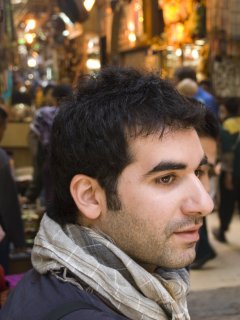Global politics largely concerns mass incarceration along with border control, political theorist Nasser Abourahme argues. To explore the two crises that define our age through the lens of the camp, he will teach HUM 310/COM 371/URB 311: Camp/Prison/Border in Fall 2018.
As the 2018–19 Fellow in the Humanities Council and Princeton-Mellon Initiative in Architecture, Urbanism and the Humanities, Abourahme envisions addressing not only each crisis individually, but also the historical, abiding connection between them. Like mass incarceration, border control seeks to rid the system of what it deems too many, and useless, people.
“Large numbers of laborers become redundant to the accumulation of capital,” he explained of a trend that began with twentieth-century neoliberalism. “There are people who can be exploited, from whom value can be extracted, to a certain degree, but who are not indispensable to the accumulation of capital. The situation creates a surplus of humanity.”
Stripped of profitability, prisoners and migrants succumb to displacement by market forces. Their bodies circulate between different forms of the camp, such as whenever American detention centers spill their excess population into federal jails. The “logic of expulsion” propels the political economy of the world, he added, borrowing the words of sociologist Saskia Sassen.

Nasser Abourahme, 2018–19 Fellow in the Humanities Council and Princeton-Mellon Initiative in Architecture, Urbanism and the Humanities
According to Abourahme, mass incarceration and border control share a colonial kinship, specifically nineteenth-century European imperialism, which included France in Algeria or Spain in Cuba. His genealogy challenges that of philosopher Giorgio Agamben, whose focus on World War II has dominated the return of the camp to political theory over the past 15 years.
“The Nazi Holocaust doesn’t come out of thin air. As people like Hannah Arendt and Aimé Césaire have shown us, it comes out of an imperial history of racialization and othering in ways that permit, that create the conditions of possibility for, genocide and extermination,” Abourahme said.
Abourahme specializes in postcolonial studies, urban geography, and political theory. His interests stem partly from his upbringing in segregated and militarized Jerusalem. Raised in Palestine until age 18, he moved to London — where he earned a bachelor’s in politics at the School of Oriental and African Studies, University of London, completed a master’s in urban planning at University College London, and worked at a think tank — before reentering Palestine at age 26.
For the next three years, he worked as an urban planner for the United Nations Relief and Works Agency for Palestine Refugees in the Near East. Daily encounters with the Palestinian camp as a contradictory, enduring structure concretized the symbol it had represented in his childhood.
Fascinated, he decided to investigate via a doctorate in Middle Eastern, South Asian, and African Studies at Columbia University. His dissertation uses the Palestinian camp to illuminate the geopolitics of Palestine, Israel, and international humanitarianism, while more generally examining the camp as an object of political thought and practice.
The doctoral program also trained him in hermeneutics, which he will harness to impart a different set of tools for thinking about mass incarceration and border control. Novels will help the class bridge the humanities and social sciences to access the lived stakes of confinement beyond statistics.
Abourahme predicted that the camp will keep attracting attention as it proliferates everywhere. Victims will multiply as technological innovations render people obsolete and therefore vulnerable to imprisonment. For example, the invention of self-driving cars might displace hundreds of thousands, possibly millions, from driving, the most common profession in America, he noted.
“Really, the impetus of the deportation regime in a country like this is not deportation. It’s creating a condition of deportability, in which people can be deported at any time,” Abourahme said.
By Ruby Shao ’17















